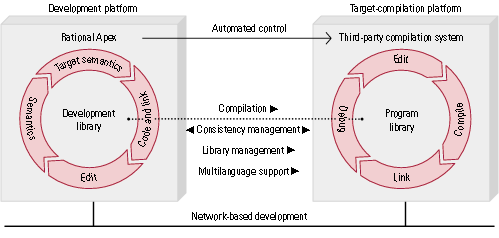
The Rational Compilation Integrator lets you manage third-party compilation systems
from Rational Apex and provides a consistent user interface and development model.
The Rational Compilation Integrator (RCI) brings the unmatched productivity advantages of Rational Apex to your project no matter what Ada compiler you use to deploy your code. Rational Apex supports a powerful method called host-based testing that makes Rational Apex a true universal development environment. You design, develop, document, integrate, test, analyze, and maintain your software using Rational Apex and its related products.
To generate the code for your target processor--which can be a mainframe, minicomputer, workstation, PC, or embedded processor--you select the Ada compiler of your choice. Referred to as the target compiler, this can be any of hundreds of commercial, off-the-shelf Ada compilers, including any from our extensive VADS compiler and cross-compiler family, or a special-purpose in-house compiler. The target compiler can be a native compiler (generating code for the same platform on which it is hosted) or a cross-compiler (generating code for a different platform).
RCI automatically invokes the target compiler and tools to generate code for your target processor. RCI performs consistency management on the compilation platform and provides a common user interface to target compilers on any platform. You use the target compiler's debugger, if available, to debug your code on the target processor.
RCI continues to add value through a project's maintenance phase. Maintenance releases are managed easily with Rational Apex's CMVC. The Rational Apex facilities for visibility of system architecture, hypertext-style browsing, and implementation traceability help maintenance engineers to understand, plan, and implement appropriate changes, while RCI ensures consistency of target software.
Target-compiler output is redirected to a Rational Apex window to give you immediate feedback about the target-compilation process. In addition, target-compiler options can be set and controlled from Rational Apex for entire target libraries or individual units. Listing, assembly, and map files and other results generated by the target-compilation process can be maintained with the rest of your project data through the Rational Apex CMVC system.
You initiate a recompilation process with the target compiler using a single RCI command. RCI determines the correct compilation order, transfers the Ada source to the target-compilation platform, and invokes the target compiler to build the software system. This process ultimately produces executable images for the target processor.

The Rational Compilation Integrator lets you manage third-party compilation systems
from Rational Apex and provides a consistent user interface and development model.
RCI can be used with a wide variety of target compilers with little modification. To take full advantage of the capabilities of the target compiler, the facility can be extended through straightforward procedures such as modifying Ada templates and parameters. This extension can be performed by you or by Rational technical representatives.